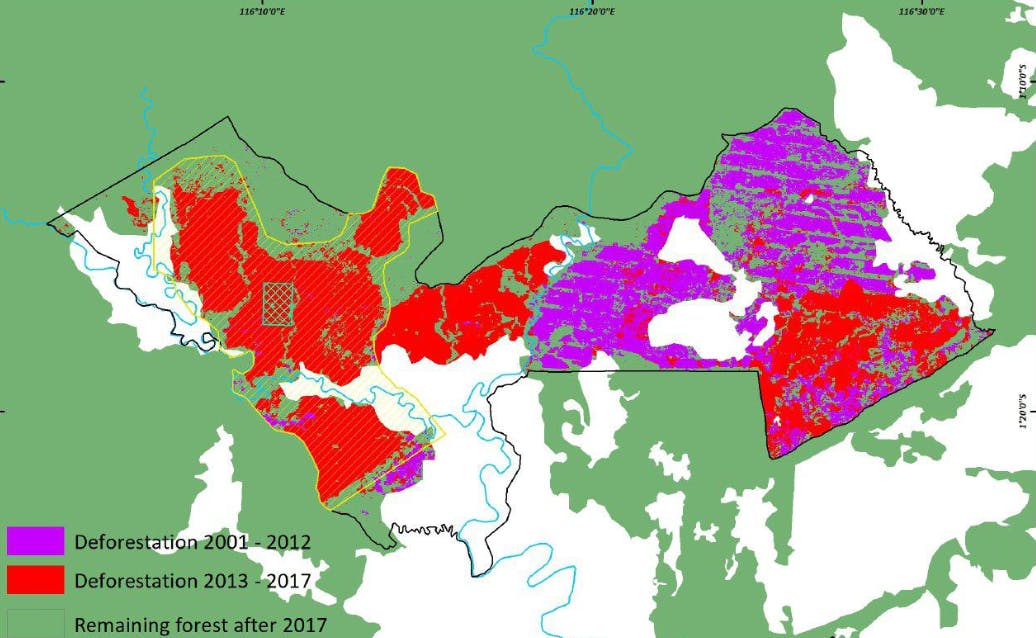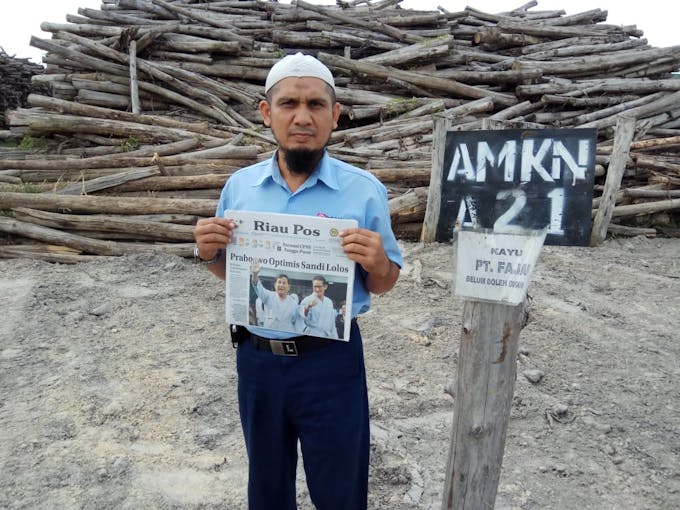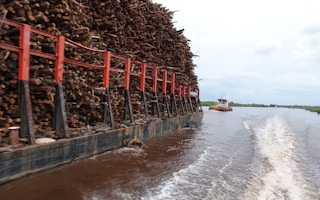Two of the world’s largest pulp and paper companies, Asia Pulp and Paper (APP) and Asia Pacific Resources International Limited (APRIL), may have defaulted on their landmark no-deforestation commitments by using suppliers linked to forest clearing in Indonesia, research shared by a coalition of non-government organisations (NGO) has found.
To continue reading, subscribe to Eco‑Business.
There's something for everyone. We offer a range of subscription plans.
- Access our stories and receive our Insights Weekly newsletter with the free EB Member plan.
- Unlock unlimited access to our content and archive with EB Circle.
- Publish your content with EB Premium.
Wood supply data from Indonesia’s forestry and environment ministry, seen by Eco-Business, show that both firms sourced wood from companies that have cleared some 32,000 hectares (ha) of rainforest—roughly half the land area of Singapore—in Borneo over the last five years.
The findings appear to violate historic pledges APP and APRIL made in 2013 and 2015 respectively to stop clearing forests as they expand their operations in Indonesia.
The report emerges just as Forest Stewardship Council (FSC) announced on Thursday that it has suspended a plan to re-engage with APP that began just over a year ago.
The certification body cited APP’s alleged links to companies engaged in “unacceptable forest management activities”. Obscured ties with suppliers, which APP has repeatedly denied, were revealed in an investigative report by Associated Press in December last year.
“APP remains disassociated from FSC, until such time as it has fulfilled the requirements set by FSC,” the organisation said in a statement.
When contacted for a response, APP told Eco-Business that it sourced wood from a deforestation-linked supplier following an “administrative lapse”, while APRIL said the fibre came from a plantation area deemed not of high conservation value when it was developed.
An axe to sustainability commitments?
APP and APRIL control a combined land area of 3.6 million ha and 80 per cent of Indonesia’s pulp production, and over the years have clashed with NGOs over forest destruction and the displacement of local communities.
Both companies have pushed back against the latest findings from the coalition, named Koalisi Anti Mafia Hutan, which includes NGOs Walhi, Pusaka, World Wide Fund for Nature (WWF) Indonesia, Auriga, Woods & Wayside International and Forest Peoples Programme.
The two suppliers at the centre of the NGO investigation — industrial pulpwood plantations firms PT Fajar Surya Swadaya (FSS) and PT Silva Rimba Lestari (SRL) — are owned by members of the Hartono family, which controls the tobacco giant Djarum Group.
Between 2013 and 2017, FSS cleared 19,221 ha of natural forest in East Kalimantan, one-third of the company’s total concession area, according to satellite imagery from Indonesia’s environment and forestry ministry. SRL deforested 12,780 ha over the same period of time.

Deforestation in the concessions of PT Fajar Surya Swadaya, from 2001-2012 (in purple) and from 2013-2017 (in red). Sources: Forest cover from Indonesia’s Ministry of Environment and Forestry land cover maps from 2000 and 2015, tree cover loss from Hansen et al. 2013 with updates for 2017 from Global Forest Change.
According to official wood use reports, APP and APRIL’s flagship mills in Riau, PT Indah Kiat Pulp & Paper and PT Riau Andalan Pulp & Paper, received 24,863 cubic metres—about 800 truckloads—and 141,183 cubic metres—about 5,000 truckloads—of plantation wood, respectively, from FSS in 2017.
In East Kalimantan, wood chip mill PT Sarana Bina Semesta Alam (SBSA), which a recent report from the NGO coalition linked to APP’s owner Sinar Mas Group, acquired 14,726 cubic metres of plantation wood and 1,151 cubic metres of mixed tropical hardwood from FSS. The hardwood was sourced from land deforested by SRL.
APP’s response: conflict logs slipped through the cracks
APP said that it “strongly rejects” the allegations in the report, and that wood fibre bought from FSS last year had been done so “erroneously” following an “administrative lapse”.
FSS had been wrongly cleared by APP’s system for testing out new suppliers, and a trial shipment delivered to Indah Kiat Pulp & Paper mill on 1 November 2017, the company told Eco-Business.
The company said that when satellite images showed that FSS had been razing forests in its concessions, the logs were quarantined.
“Even though it was paid for and delivered, the wood from PT FSS has not, and will not, be permitted to enter the APP supply chain,” APP said.

An APP employee at the Indah Kiat Pulp & Paper mill holds a copy of Tuesday’s newspaper in front of a yard of quarantined logs from FSS to show the logs did not enter their supply chain. Image: APP
The company says it is considering how to put the 27,300 tons of quarantined logs to “responsible use,” giving as one option using them as fuel for the mill’s boilers.
Elim Sritaba, APP’s director, sustainability and stakeholder engagement, said that the company’s sustainability auditors and NGO partners were alerted to the incident, which was shared at a stakeholder workshop in Jakarta in May this year.
APP added that it has “no legal or financial connections or influence” over SBSA, the wood chip mill in East Kalimantan, and has not procured any wood from SRL.
APRIL’s response: Wood was sourced from ‘non-HCV’ areas
APRIL said that it sourced fibre from FSS in line with its sustainable forestry policy, and had determined that FSS had developed plantations in areas of low conservation value.
The company said that decision was made based on a High Conservation Value (HCV) assessment of FSS’s concessions by Netherlands-based forestry non-profit Tropenbos International in April 2015. “Based on this, plantation development was done in non-HCV areas,” APRIL said in a statement.
HCV is an industry metric to determine whether a forest is of particularly high conservation value, and so is worthy of conservation.
APRIL added that a recent report by auditing firm KPMG found that “APRIL’s zero deforestation and no mixed hardwood use commitments [introduced in 2015] have been upheld.”
The company said it has not received any wood from SRL.
While KPMG has determined that the FSS supply is not in violation of the sustainable forestry policy, Syahrul, a researcher with Auriga, an Indonesian NGO member of the coalition, has a differing view.
He said the findings “draw a big question mark over the credibility of their [APP and APRIL’s] sustainability policies” and how they are monitored.
TFT told Eco-Business that APP had informed it of the purchasing error in March, and had conducted a field study at Indah Kiat Pulp & Paper mill to ensure that the quarantined logs did not enter APP’s production line.
The consultancy added that it advised APP to publicly share the news at the stakeholder workshop.
Following the incident, APP has “made stronger commitments” to strengthen the process for evaluating new suppliers, TFT told Eco-Business. The company is to integrate a public consultation process that invites all stakeholders to provide feedback within 14 days on all of APP’s potential suppliers.
The NGOs called on buyers and investors to avoid doing business with APP and APRIL until they meet their own sustainability targets.
In their report, they noted APP’s construction of a massive pulp mill in South Sumatra last year and raised concerns whether it will have sufficient plantation supply to meet their ambitions.

















